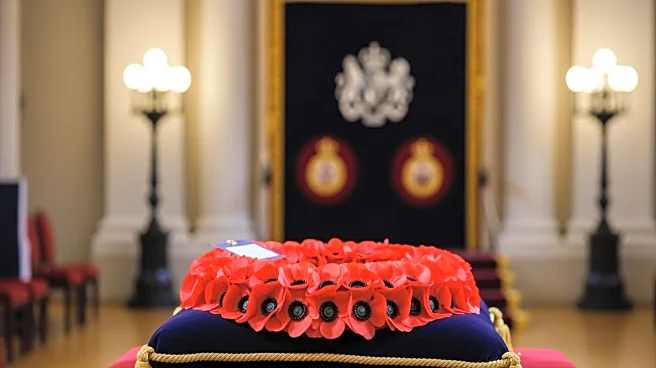What's Happening?
Prince George joined King Charles III, Queen Camilla, and Catherine, Princess of Wales, at the Festival of Remembrance held at London's Royal Albert Hall. The event, organized by the Royal British Legion,
commemorates those who lost their lives in service and marks the 80th anniversary of the end of World War Two. It also reflects on the discrimination faced by LGBT personnel, 25 years after the ban on gay people serving in the armed forces was lifted. Prime Minister Sir Keir Starmer and Lady Victoria Starmer were among the attendees. The event featured performances by musicians such as Sir Rod Stewart and Sam Ryder, accompanied by armed forces bands, including the RAF Squadronaires. Veterans, including those who planned D-Day and former prisoners of war, were present, along with members of the LGBTQ+ veterans charity Fighting With Pride.
Why It's Important?
The Festival of Remembrance serves as a poignant reminder of the sacrifices made by service members and highlights the progress in addressing discrimination within the armed forces. The inclusion of LGBT veterans and the unveiling of a memorial to lesbian, gay, bisexual, and transgender military personnel by King Charles III underscores the ongoing efforts to recognize and honor diverse contributions to national service. This event not only commemorates historical milestones but also fosters inclusivity and awareness of past injustices, contributing to a broader societal understanding and acceptance.
What's Next?
The Festival of Remembrance sets the stage for Remembrance Sunday, where a two-minute silence will be observed to honor those who served in World War One. The continued engagement of the Royal Family and government officials in such events may encourage further initiatives to support veterans and promote inclusivity within the armed forces. The presence of high-profile figures and the media coverage could lead to increased public awareness and support for veteran-related causes.
Beyond the Headlines
The event highlights the cultural significance of remembrance and the evolving narrative around military service, particularly concerning LGBT rights. The participation of diverse groups and the acknowledgment of past discrimination reflect broader societal shifts towards inclusivity and equality. This cultural dimension may influence future policies and public attitudes towards veterans and minority groups within the military.










